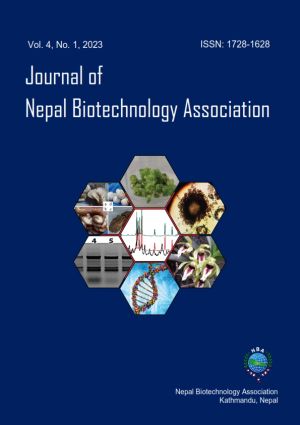Growth Promoting Role of Phytase Producing Bacteria Isolated from Bambusa tulda Roxb. Rhizosphere in Maize Seedlings Under Pot Conditions
DOI:
https://doi.org/10.3126/jnba.v4i1.53442Keywords:
Biofertilizer, Phytate, Pikovskaya's agar, Plant growth promotion, Pot assayAbstract
Phytase enzymes have focused on their role in agriculture to generate bioavailable phosphorus (P) requires for plant nutrition. Herein, the feasibility of phytase-producing microbes as biofertilizers was studied. Bacteria with greater potential for hydrolysing calcium phytate based on the halo-to-colony ratio from Bambusa tulda Roxb. rhizosphere was isolated. Phytase activity by incorporating wheat bran, phytase screening and Luria Bertani (LB) medium after acetone precipitation was measured. Bacterial genomes were screened for the presence of β-propeller phytase gene corresponding to the Bacillus spp. using polymerase chain reaction (PCR). Finally, the effect of the isolates on the growth of maize seedlings under pot conditions in P-deficient loamy soil was evaluated. Ten distinct bacterial isolates collected from B. tulda rhizosphere were capable of mineralizing phytate and the maximum effect was observed for designated SRBR-04. Most isolates solubilized Ca3(PO4)2 as a sole P source in Pikovskaya’s agar. Five isolates selected for the study synthesized auxin in the LB broth supplemented with 1 mg mL-1 L-Tryptophan (1.63 to 4.5 μg mL-1). Phytase production was highest in wheat bran with isolate SRBR-04 producing a maximum of 0.34 U mg-1. Two isolates (SRBR-01, SRBR-04) screened positive for the presence of Bacillus phytase gene. Pot assay in P-deficient soil showed significant (p < 0.05) biomass promotion for the isolate SRBR-07 in shoot height (57%), dry shoot weight (178%), dry root weight (104%) and leaf area (113%) over the untreated control. Amendment of P-deficient agricultural soils with phytase-producing bacteria would provide a sustainable approach for P nutrition management in Zea mays.




